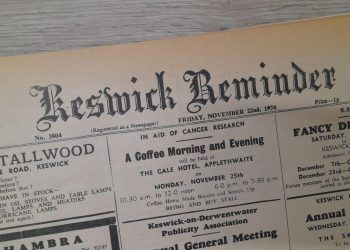
A Dollop of Wallop – with Harry Wallop
Is the Lake District National Park Authority fit for purpose? Recently, The Keswick Reminder reported on the LDNPA’s unwillingness to investigate an alleged breach of local occupancy clauses at five apartments at The Warehouse on Southey Street.
It said, in classic quango-speak, the authority was “not in a staffing and workload position to take this forward at the moment”.
A classic case of “computer says no”, of yet another public body who still – a full three years after the first lockdown was implemented – appears to be struggling to do the job it is paid to do.
Its inability to crack down on alleged breaches of local occupancy rules really matters. Because one of the LDNPA’s main jobs is to act as planning authority for the area – both to ensure that enough homes for local people are granted permission to be built and enough affordable homes are also granted permission.
How is it doing? Its latest annual accounts, which only go up to March 2022 and which are bizarrely littered with smiley and sad faces (does it think we can’t only understand emojis?), said it granted permission for 43 local-needs homes, down on the previous year’s 79 but still above its target of 40 – smiley face!
When it comes to affordable homes it granted…one. Sad face. Yes, really.
Just one affordable home across the entire national park was granted permission to be built last year.
This is pretty diabolical, and a key factor in the lack of affordable homes for local people. Dare I say it, is just as big a factor if not bigger than the influx of second home owners buying up existing properties.
Earlier this month the new Westmorland and Furness council voted to double council tax on second home owners, in an attempt to make it far less attractive for people to purchase houses that could otherwise go to local families. This might make a difference, it might not.
But there’s a couple of things that would have a far more immediate effect on deterring people buying up second homes. One, is for sellers to put restrictive covenants on their property – demanding their homes can only be sold to a local family. It can be done. And if locals are upset enough about the changing character of the north Lakes to want properties to remain in locals’ hands, that would be one move that might help.
The other is for the LDNPA to police the existing regulations better. There are hundreds of properties that have, in effect, these restrictive covenants either because they are new properties or conversions.
The LDNPA claims it does not have the resources to go and knock on doors or – in their corporate speak – “are still only able to work on a reactive for the foreseeable”. That’s not good enough.
The authority’s own “vision for 2030” states: “We plan for the future, recognising that our future sustainability is in our own hands.” Well, if it’s in your hands, jolly well pull your finger out.








